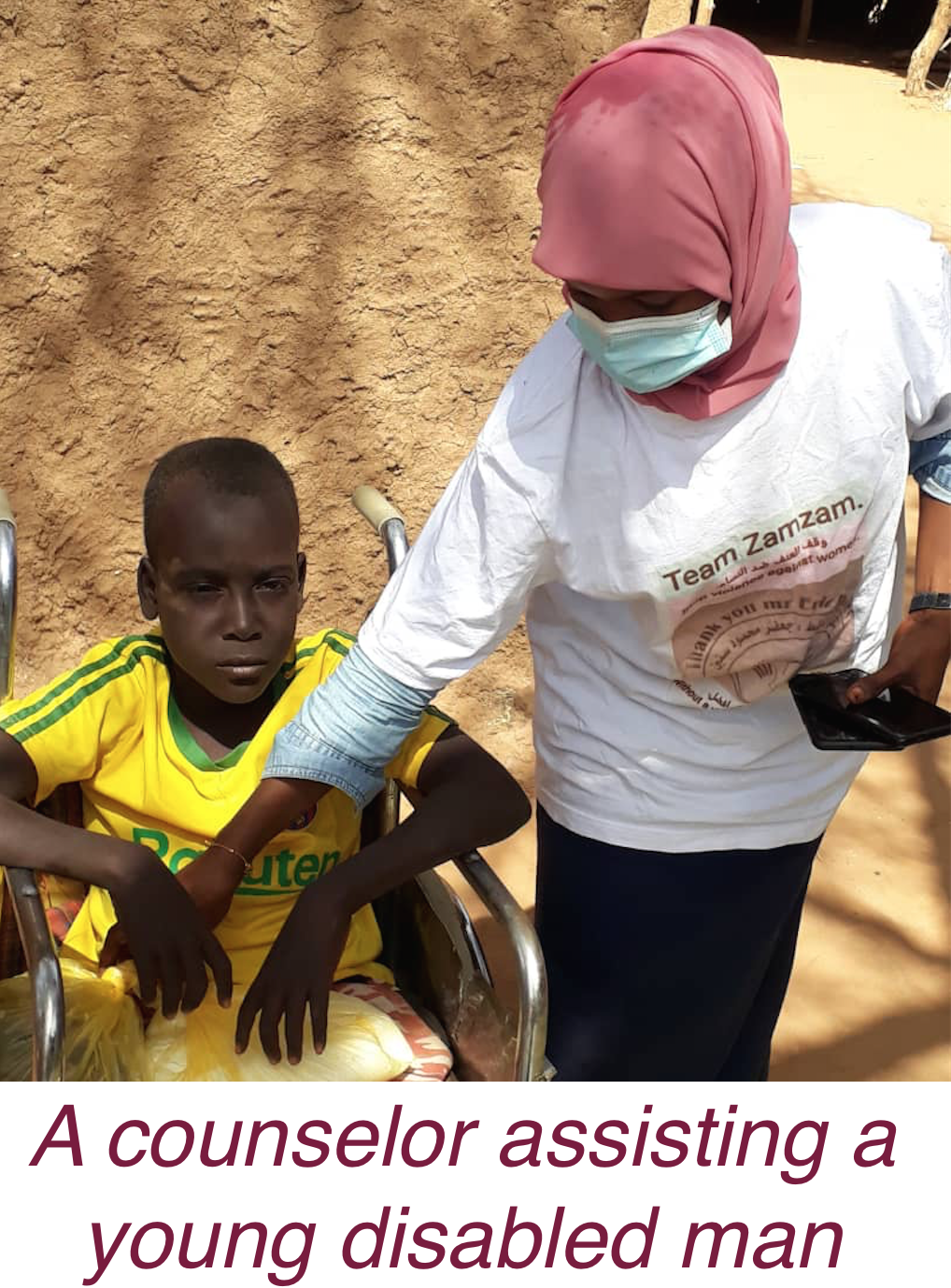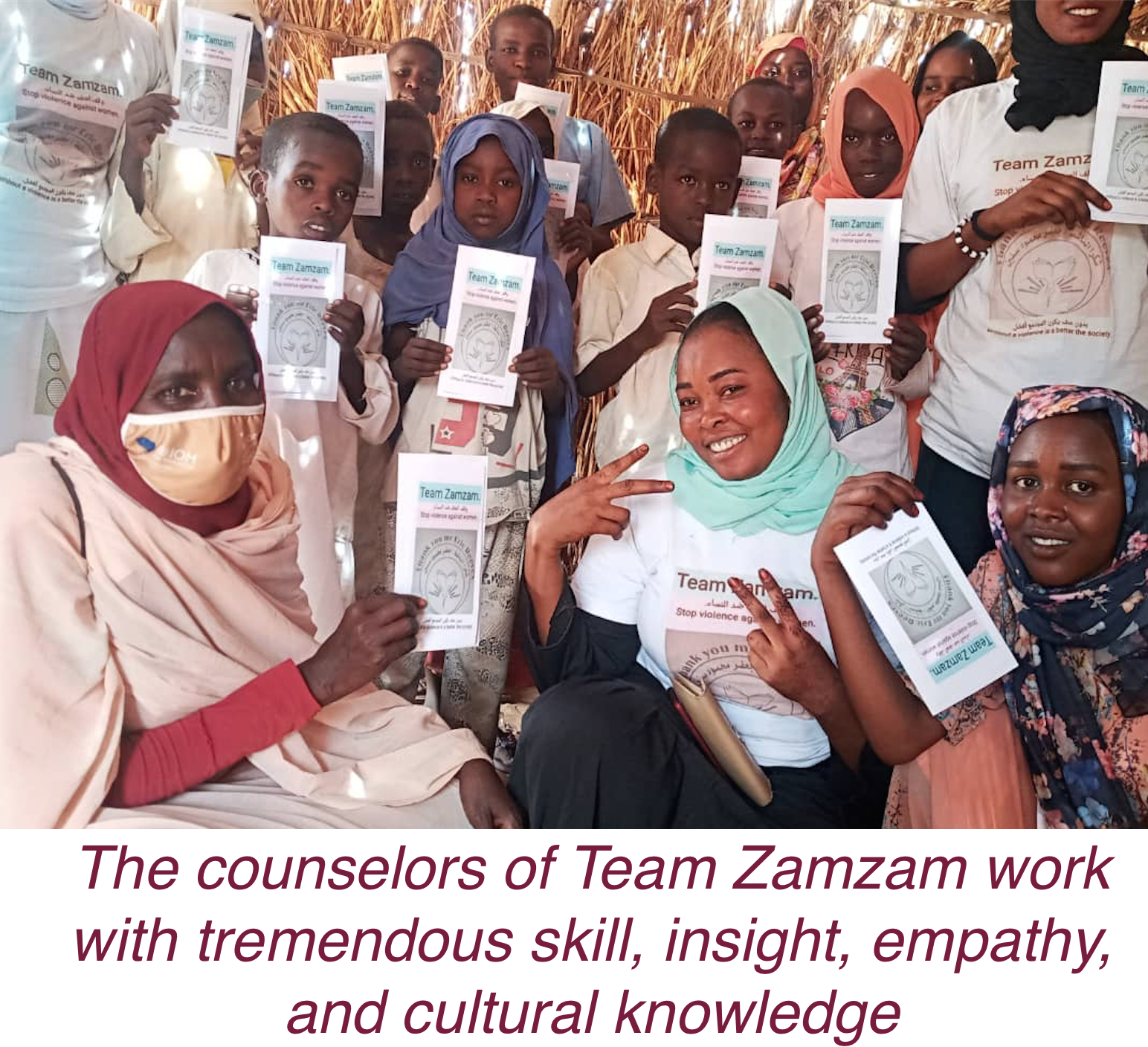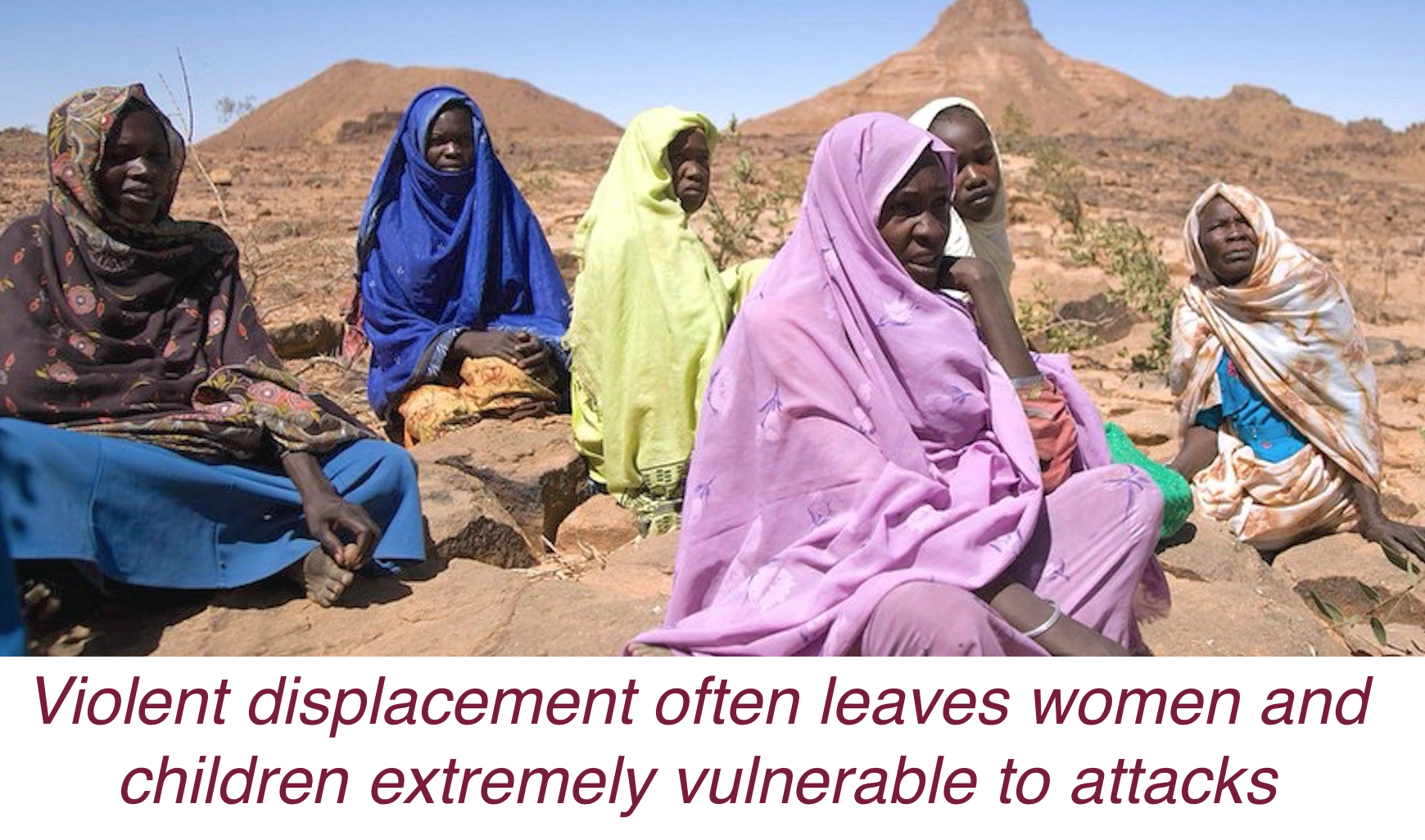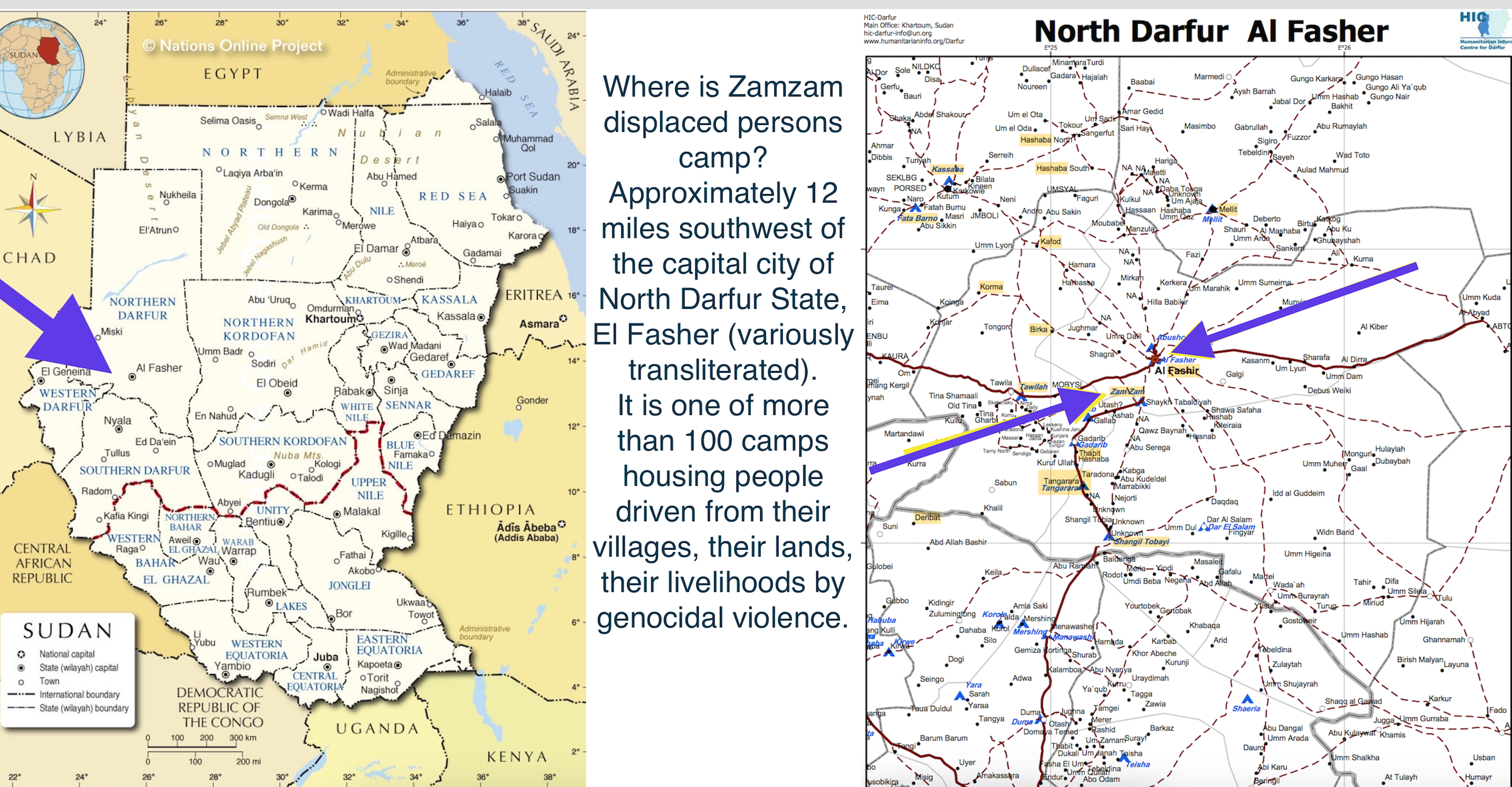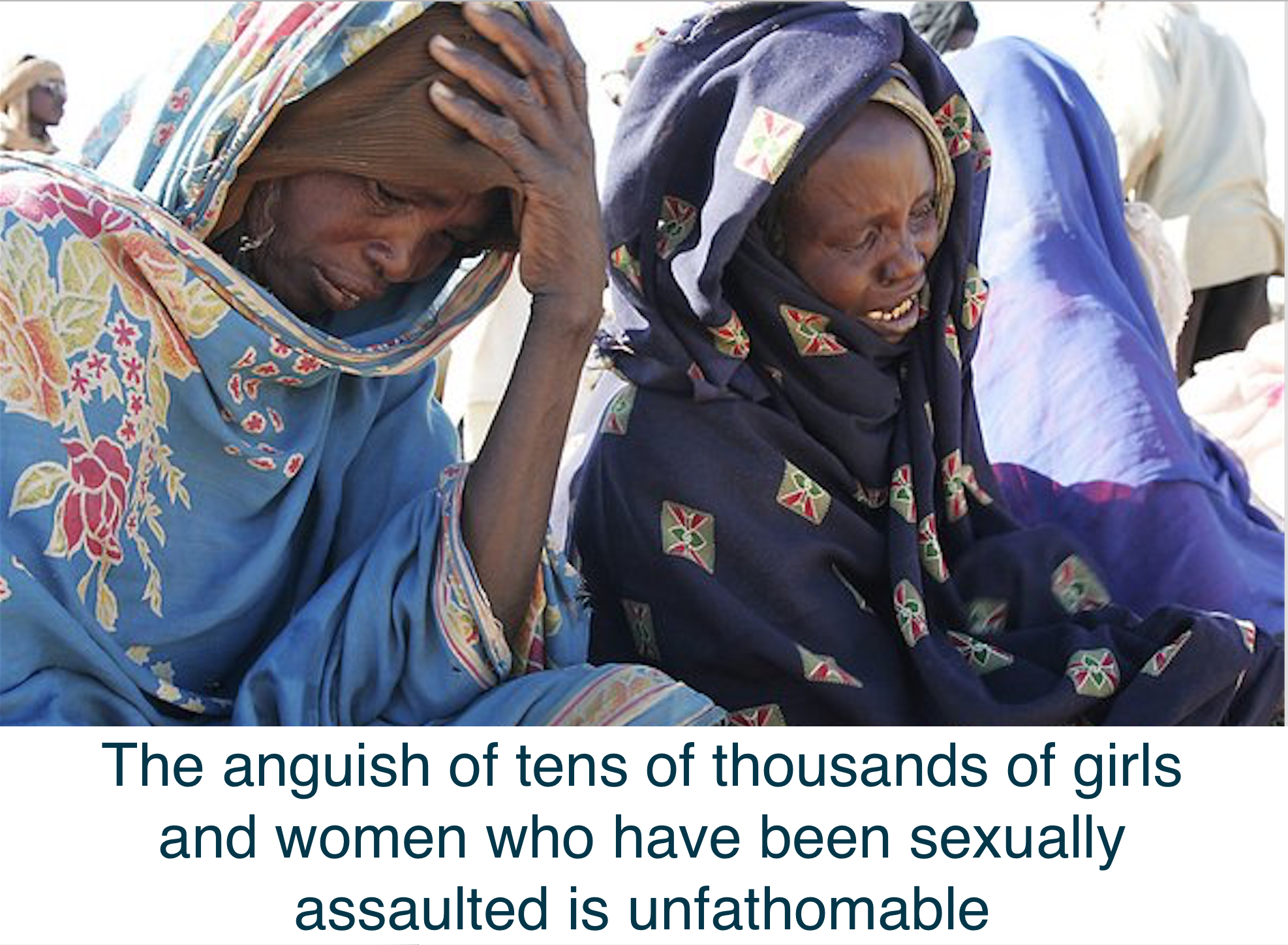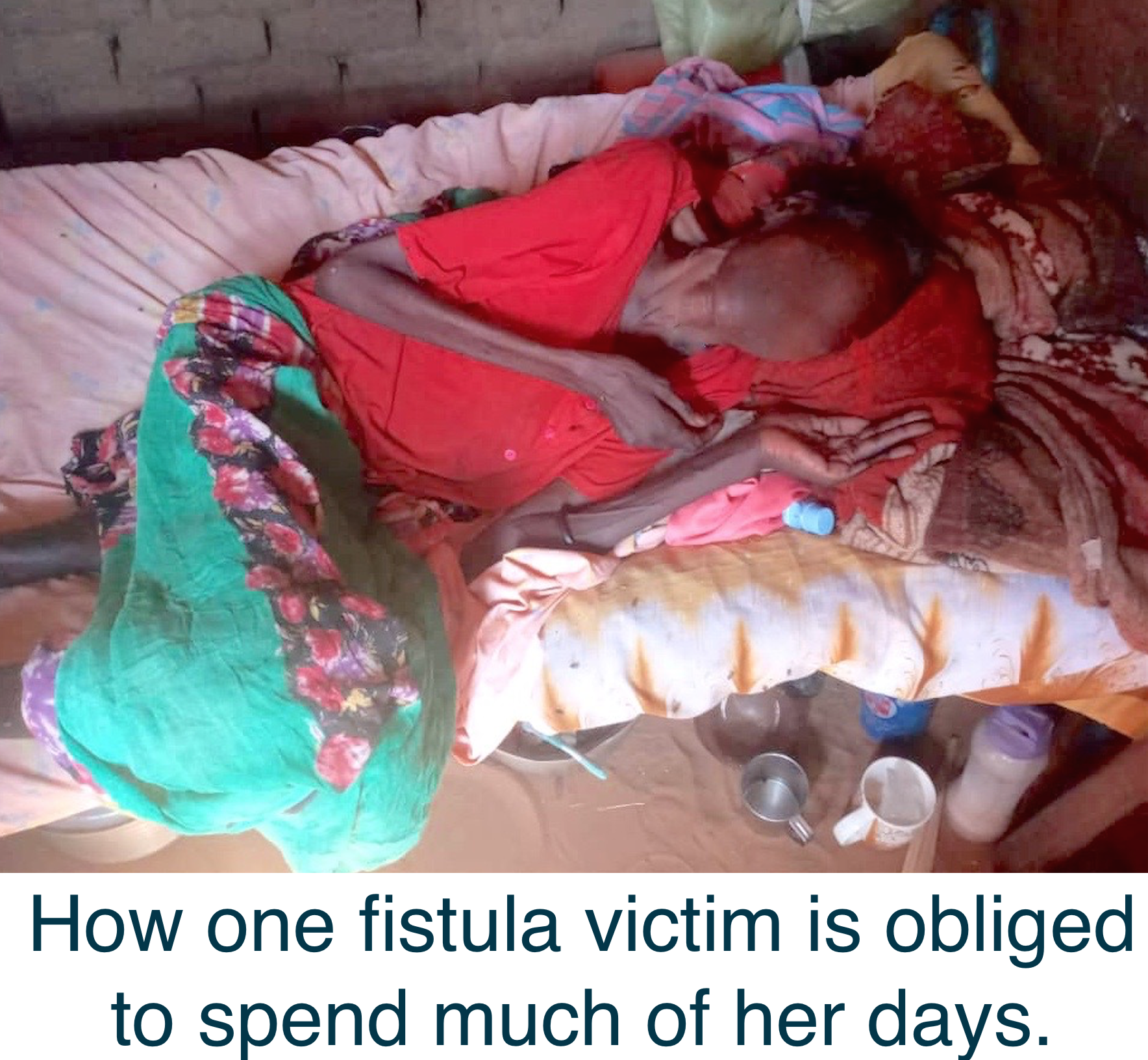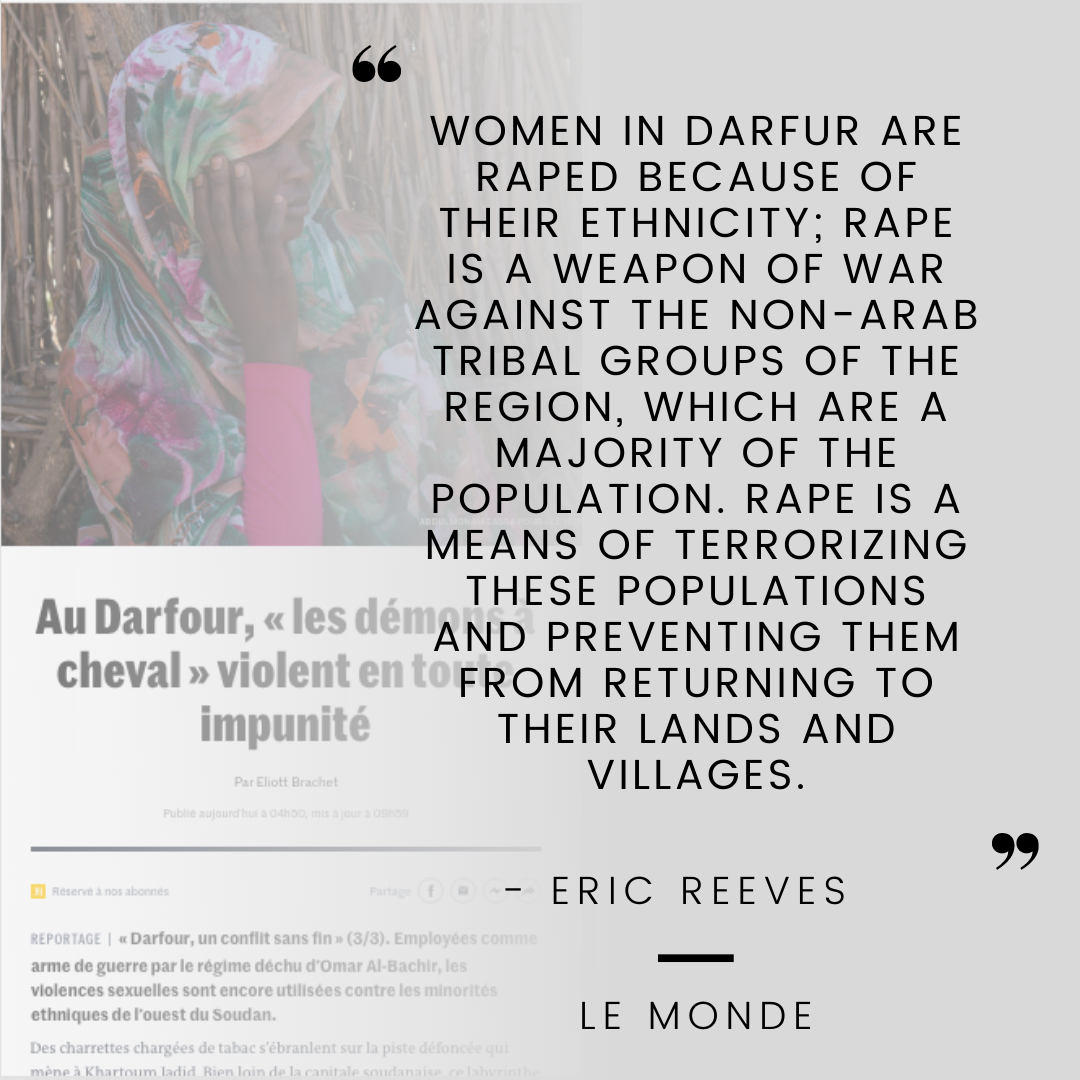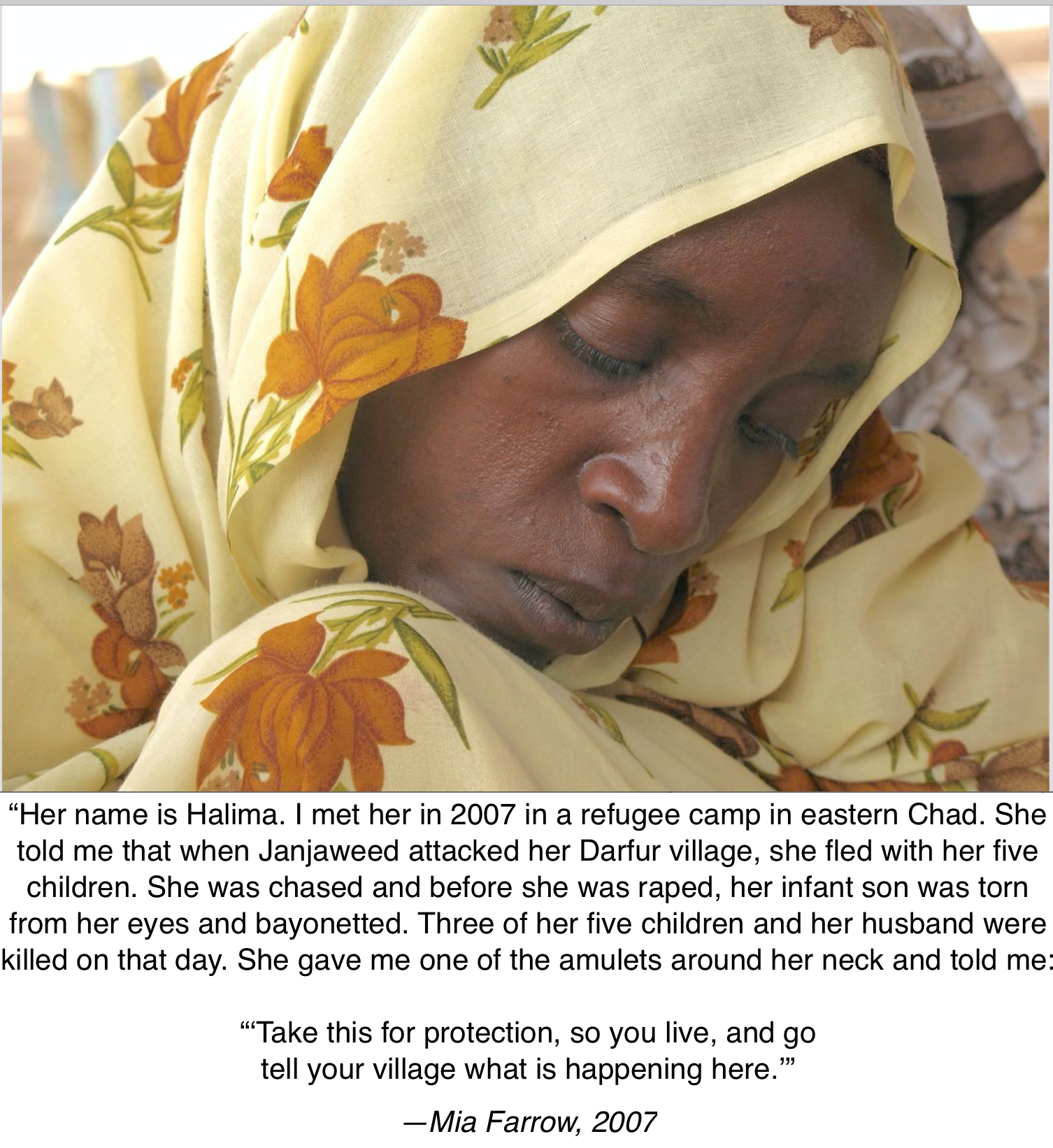(Previous updates are archived at | https://www.ericreeves-woodturner.com/blog/
(To provide help for our project, see | https://www.ericreeves-woodturner.com/gallery/
Introduction (Eric Reeves)
What I find particularly remarkable in the reports coming to me from Zamzam IDP camp is how fully the counselors have seized on the opportunities our project has provided them. With modest resources, they provide counseling—now to over 1,000 girls and women since our project began last September. And they provide counseling services to those most seriously traumatized by sexual violence, even traveling into rural areas that are far from fully secure. They assist women suffering from fistulas to gain access to the surgical clinic in El Fasher and provide not only transportation, but pre- and post-operative care. We are now funding three fistula repair surgeries per month at $400 per procedure and have had six successful such procedures (sadly, the waiting list is very long, and growing, and counselors have the unenviable task of establishing priority).
They also use their intimate knowledge of the four quadrants of Zamzam camp to provide the most basic essentials to those most in need: the disabled, the very elderly, widows with children. Every month they distribute more than $1,000 in desperately needed food and other critical supplies.
A typical week sees the counselors serving over 100 people (here the week of April 5 – 12):
(Report from the coordinating counselor):
113 people, consisting of 32 families of the poorest groups and the disabled, have benefited during this round of distribution. The types of commodities include sugar, flour, lentils, beans, and dates for Ramadan:13 people with disabilities
9 deaf people
6 blind people
85 people from the very poorest groups in the camp
There has been a continuous distribution of sanitizing soap (now totaling thousands of bars) as well as hundreds of feminine hygiene kits, along with essential medicine when available (especially antibiotics). The counselors have also distributed masks as well as advice on prophylactic measures as Covid-19 begins its deeply ominous resurgence in Sudan. In this respect, Zamzam IDP camp is at acute risk, for even with a very large “footprint” it houses more than 250,000 displaced persons according the 90+ omdas (senior tribal leaders) who provide civilian governance in the camp. Overcrowding makes social distancing impossible, and there is much more work to be done in the provision of masks and materials to be sewn into masks.
The Essential Task
While the dramatic results of a successful fistula surgery seem almost miraculous to those helped, the real work “at scale” by the counselors is with the terribly damaged psyches of girls and women who have been so brutalized by sexual violence, often in front of witnesses, including parents.
Again, more than 1,000 girls and women—most in Zamzam camp, but some in insecure rural areas—have received desperately needed assistance. I recently posted some of the most remarkable testimonies to the successes the counselors have achieved with these victims, but there are many, many others. It takes tremendous skill, insight, empathy, and cultural knowledge to break through the overwhelming sense of shame and often clinical depression that burdens those whom the counselors seek to help. Many have never spoken to anyone, even family, about what they have suffered and continue to suffer.
And yet the counselors only become more skilled, more resourceful, and more in demand for their therapeutic help—including in rural areas where word of their growing abilities and understanding continues to spread rapidly. Our hope is eventually to expand the number of counselors from the present 16 to 30, with an additional person added to the security team the provides escort protection both in the vast camp and rural areas. (One member of this team has access to a car, which provides transportation to and from El Fasher.)
Counseling services, even during the month of Ramadan (which runs through May 12), continue apace, even as, tragically, more and more rape cases are reported in the El Fasher area of North Darfur as well as other parts of the large and still violent region. We can get some sense of just how active the counselors have been looking at the report for the first two weeks of April:
(Report from the coordinating counselor):
From March 31 until today [April 13], private talk sessions and individual counseling have been carried out in the all four sections of the camp as well as outside of the camp. In total, 143 persons have been seen so far this month and our work will continue on daily basis. Four counselors have been assigned to cases in rural areas.
Age of people who attended counseling sessions:\
43 young girls between the ages of 14 and 16
86 young girls between the ages of 18 and 22
14 girls age over the age of 22
Numbers of counseling sessions:
136 sessions in Zamzam camp
33 sessions in rural areas
My colleague Gaffar has been in very regular communication with the coordinator for the counselors, a woman of obviously great skill, determination, and moral strength. Further representative highlights from her reports appear in the document below, revealing both the challenges and remarkable successes of the past month. But here it is critically important to note again the deteriorating security situation in the El Fasher area and Darfur generally: with completion of the January 1, 2021 withdrawal of the UN/African Union Mission in Darfur (UNAMID), the last vestige of an international commitment to civilian protection ended. Increased violence has predictably ensued, including the most brutal forms of sexual violence. Much is conveyed in the coordinating counselor’s reports.
The need for a project committed to the ongoing treatment of and assistance to victims of sexual violence could hardly be clearer. I am honored and humbled by the help the women of Zamzam are providing to their sisters in need.
Where is Zamzam camp?
See also: https://www.researchgate.net/figure/Zam-Zam-IDP-camp-in-Northern-Darfur-Sudan_fig1_238570761
Reports from the coordinating counselor in Zamzam, transcribed and translated by Gaffar Mohammud Saeneen (GMS), lightly edited for clarity
- Rural activities of the counselors (received April 23)
[GMS] In the past two days (April 21 – 22), the counselors have carried out many activities and counseling sessions in the camp and in the countryside as well. They have visited two villages in the Shangil Tobaya area and in one village in Umm Hashaba in North Darfur.]
[From coordinating counselor]:
“In Shangil Tobaya we have met 13 young victims, mostly girls between the ages of 13 and 17, eight of whom are victims from the last rainy season. The condition of these girls is very worrying, but we have assured them that we will see them again next month.
“As for the village of Umm Hashaba, we met four victims: three girls between the ages of 17 and 27 and one in her late thirties. One of these four victims is suffering from severe pain in her vaginal area. This girl had been assaulted last year, and after the assault [the Arab assailants] stabbed her with a sharp object in her vagina. Her family couldn’t afford to take her to the hospital in El-Fasher because she is without a father and her mother had no way of providing for their daily ends.
“Her condition made three of us who went there to meet her cry; but we have assured them that we will come to see them again. This girl is such remarkable brave: she didn’t hesitate to tell us what happened to her when three crazed Janjaweed assaulted for hours before stabbing her with a sharp object (the “Janjaweed” are irregular Arab militias; the word is often translated as “devil(s) on horseback”). Her name is Magbola and I think she needs urgent medical treatment. When we met her it was past mid-day and she was going to fetch water. During this time we managed to gather all necessary information about what happened to her; next month we meet will her again and gather and additional information.”
- The nature of violence experienced by girls and women (received April 10)
[Narrative relayed by coordinating counselor]:
“My name is Halima, I am 17 years old now, I have three sisters and two young male brothers and we all now live in Zamzam with our widowed mother. My father was killed in the Darfur war and I was two years old when we came to Zamzam. I do not know much about what happened when we left our village in Galab because I was a child. Last year, while we were at the farm with my mother and two of my siblings, five Arab armed men came to us from the Galab area. They forcibly took me with them, and during this incident my mother tried to rescue me, but she was severely beaten and they hit her in the head. My mother lost her balance and fell to the ground.
“From there they took me to their tent on camel-back, about an hour away from our farm. After two days of [ongoing sexual assault] they released me and threatened me if I were to say anything to anyone: my family would be subject to murder.
“For those days [in captivity] I didn’t know what was happening to me. All I was feeling was pain—it was was so very painful. After this experience I felt a severe pain for many weeks, and I still feel pain sometimes.
“I didn’t want to talk about what happened to me with anyone—until sisters from Team Zamzam came to encourage me to be strong. I have seen them for two months now and I’m feeling stronger, happier—and sometimes feel stupid for not taking the opportunity to talk to them earlier. Sisters from Team Zamzam helped me and I will never forget them.”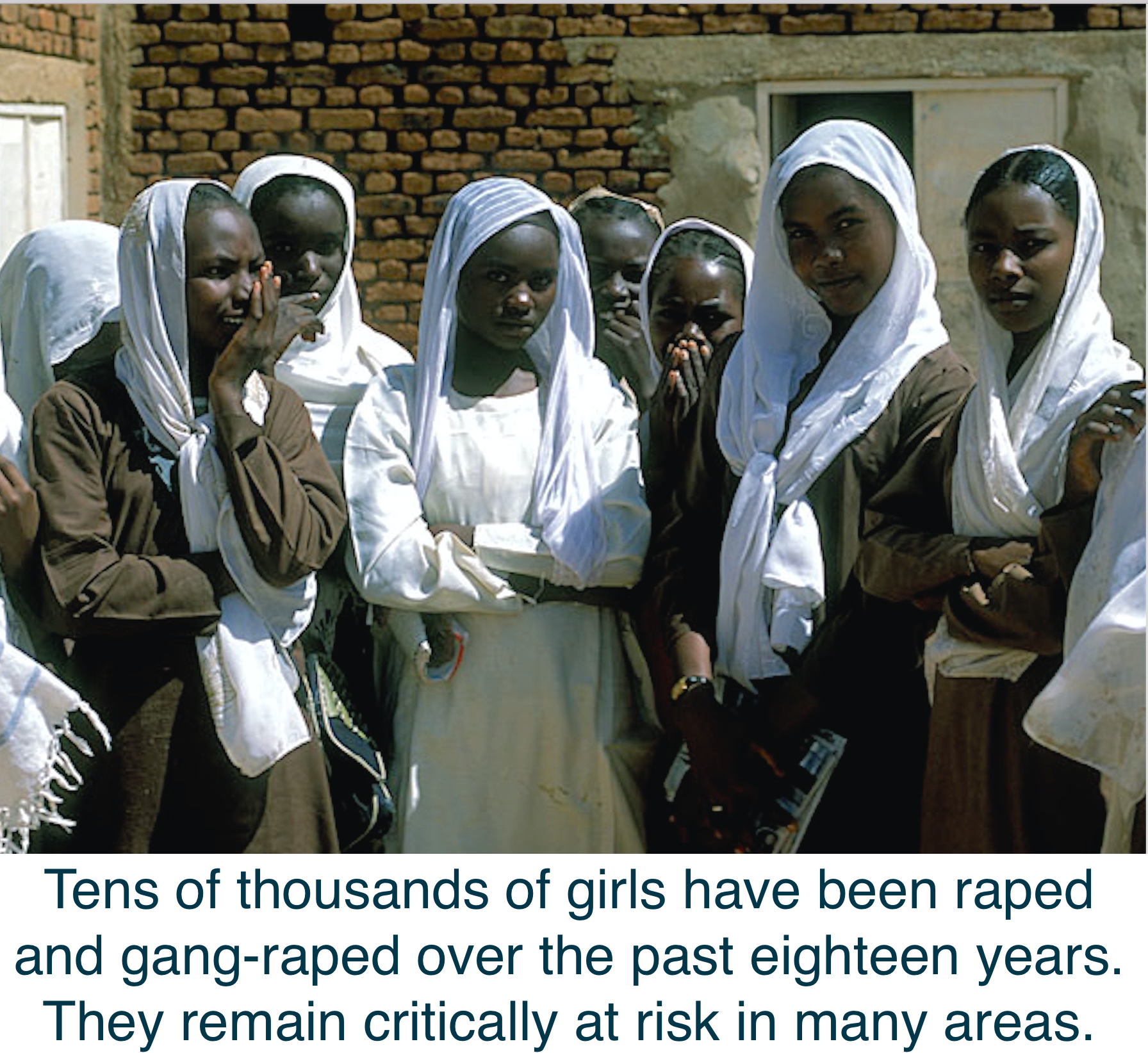
- A report from the coordinating counselor on two Fistula procedures (received April 26)
“Yesterday (April 25] I took the Nabila Mohamed (xxx) and Samia Adam (xxx) to the surgical clinic in El Fasher for their appointments. Praise be to God, the operation has been done quickly and successfully. Their psychological state is very good and right now they are doing well. They will be kept there for a couple days and then will be discharged. We left both of them under the supervision of one counselor and Nabila’s mother. Nabila’s mother has been very helpful; she is strong woman. She sends you very emotional and warm greetings and appreciation for helping her daughter. Nabila’s mother had been dreaming of gathering only a small amount of money to buy medicine for her daughter, but now she is relieved and overwhelmed by joy.”
- Ramadan and the activities of the project (received April 17)
[GMS] With the arrival of the month of Ramadan, the movements of the counselors will be slightly decreased due to the high temperature. But they continue their activities on a daily basis. Since the beginning of Ramadan, they have started their daily duty as early as 6am and continuing to 1pm, and then they reconvene after breaking of the fast at 6pm.
The coordinator called me this morning to say that in the past 10 days they have received numerous calls from rural areas and they are looking to visit two of them before end of April. She said:
“In the coming weeks and months [in the run-up to the rainy/planting season] we expect many more young girls to come forward with horrible stories. We receive these accounts since people have now begun to realise the importance of our work.”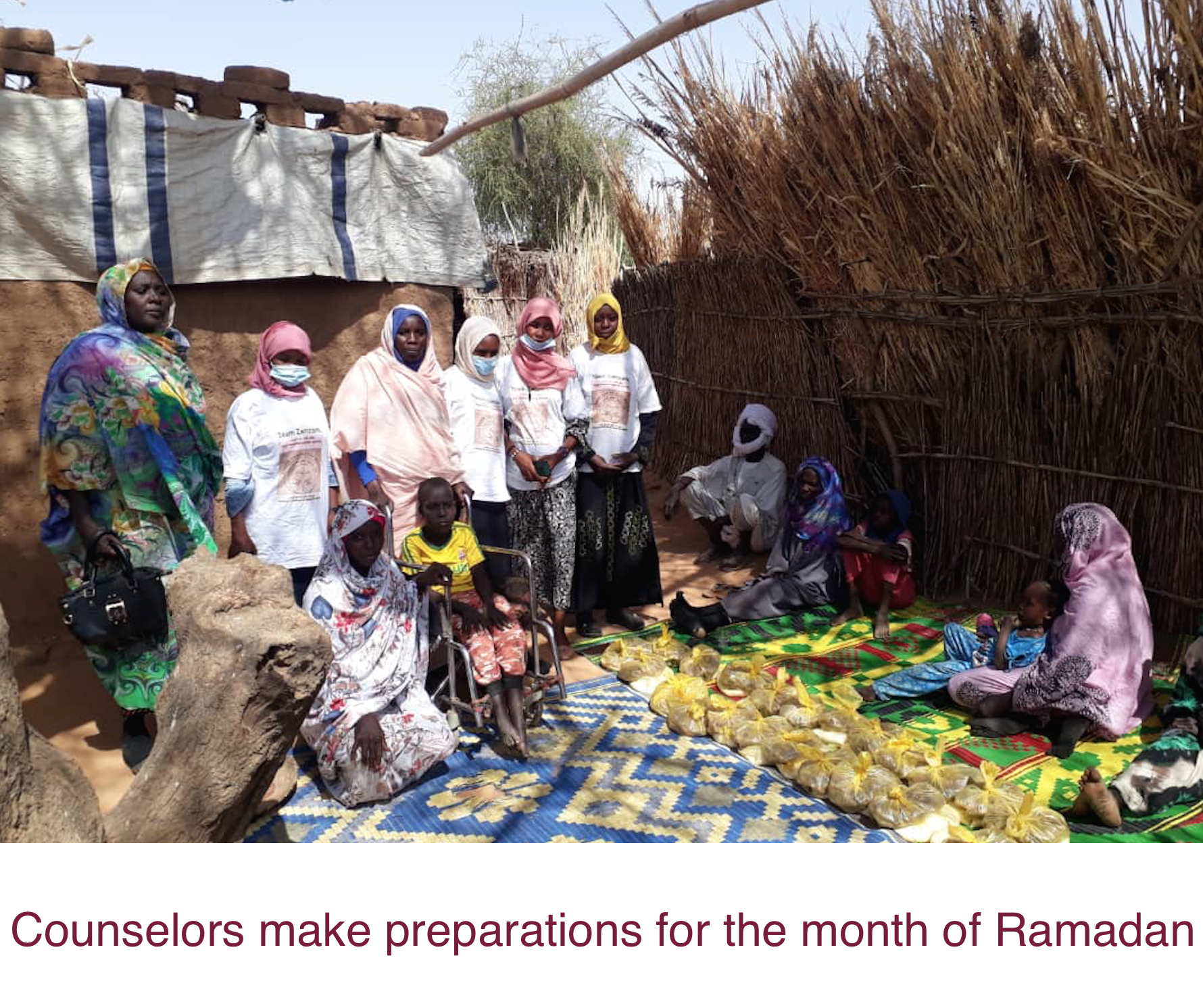
- April 3 monthly planning meeting, as relayed by coordinating counselor:
Outcomes of today’s meeting and action plan for month of April; minutes of the meeting:
[GMS] In the presence of all members of Team Zamzam, the coordinator presented a comprehensive overview on the achievements of the past month and concluded her talks about the current health challenges and thanked her team members for their individual and collective efforts.
The coordinator said:
“All these achievements and efforts that brought happiness, joy, and reassurance into the hearts of people in Zamzam. But they did not just fall from heaven by a miracle of the divine, but rather by the grace of the certain individuals who think like the prophets. People like professor Eric Reeves, Gaffar, and their other colleagues who are working hard to improve our lives here and reduce people’s misery for the sake of noble human values. We owe them a debt of gratitude. Therefore, on behalf of my colleagues, I renew our sincere expressions of gratitude—to everyone who has supported this beautiful project.”
The coordinator also said:
“The month of March was not much different from the previous months in terms of methodology of work, but we noticed the level of improvement increasing with the increase in the number of new arrivals to attend the sessions. It seems many people are starting to hear about the benefits of this program from the girls who have attended previous counseling sessions and this is very good.”
The coordinator also said,
“While working with these girls, we noticed more than four girls who are still suffering from pain due to circumcision [female genital mutilation], and there could be more who suffering in silence, even though there have been decisions taken by the government to prevent this senseless practice. But it continues in secret, and in the next stage we must educate people about it.”
The situation of victims of sexual violence
The coordinator said,
“We have noticed a positive development in the behavior of young girls and a rise in the level of self-confidence; and we now can say with assurance that we have been able to break the psychological barrier that resulted from the stigma and social isolation that follow from sexual assault. At the beginning it was very difficult to talk them about what was going on inside their heads, but now things are different. Some of the victims brought their friends to the counseling sessions and this has helped us a lot. That’s why last month we rewarded some of those with recreational trip to El Fasher, which was useful and helpful and which we intend to do this again for this month.”
Fistula patients:
The coordinator said,
“The number of fistula patients who are on the list of priorities was 39 people in total, and yesterday in late hours we have registered two new patients, so now we have 41 people in total [this number has grown significantly since April 3—ER]. From among them 22-year-old Nawal Musa (xxx) has been chosen to undergo surgery for this month, and an appointment with a surgeon had been booked for April 13.
Health situation:
The coordinator said,
“We noticed a significant deterioration in the last week of March, and have received many reports received from the camp residents, and reports are still coming. Nobody knows what is caused of the illness but people are complaining from a dry fever, high temperature in the body and coughing.”
[ER—There is good reason to believe that these are symptoms of Covid-19 infection.]
The coordinator’s conclusion of the April 3 meeting:
• We have agreed that the distribution plan must continue with the same approach, with slight changes in the food items due to the approach of the month of Ramadan;
• Priority should be given to health guidelines and raising awareness;
• We must re-double our efforts in counseling sessions and private talk sessions
• Visits to rural areas to provide psychological counseling through private talk sessions are critical;
• Follow up procedural paper works and appointments for fistula patient (Nawal Musa xxx) must be completed;
• We must arrange for an recreational trip for the girls to visit El Fasher city, including the cinema and the museum, before the start of Ramadan in less than two weeks;
• We must prepare and arrange for a day of hot lunch plates, with gifts of school supplies to the young orphans of the camp.

